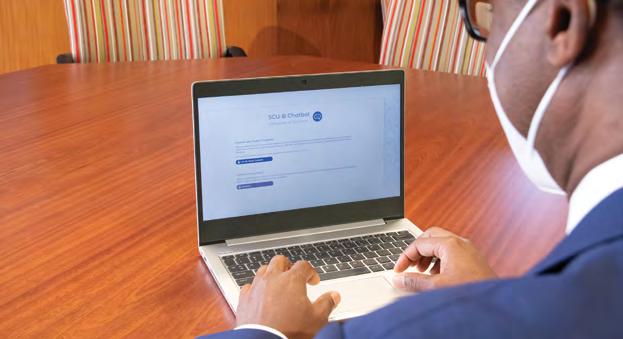
19 minute read
Teaching and Learning
2
Teaching and Learning
Our hybrid model of online and contact teaching is a pedagogy designed to enable our students to succeed at university and in life.
In an age of overwhelming choice, UP continues to attract a substantial number of top students and staff and to produce quality graduates who contribute to the knowledge economy. As one of the largest contact and residential universities in South Africa, with nine faculties and a business school spread across seven campuses, we have a responsibility to enhance access to higher education and successful learning.
UP was one of few universities able to complete the academic year successfully in 2020, in the face of the immense disruptions COVID-19 caused in education in South Africa. The pandemic forced universities to take innovative paths. Our teaching and learning approach is inquiry driven and community based, encouraging students to seek out additional resources and put their knowledge to practical use through engagement in the communities neighbouring our campuses. Contact sessions in traditional lecture halls, seminars, laboratories and practical sites are combined with online learning and teaching, based on our experience of more than 20 years of digital education.
ACCESS FOR SUCCESS
A total of 8 620 first-year students registered at UP in 2020, either online, or in person, and over 700 of them had achieved six or more distinctions in the schoolleaving examinations. The UP student body is becoming increasingly representative of the country’s demographics. Of the total enrolment of 48 304 contact students (excluding occasional students), 26.5% were postgraduates in 2020, and of these postgraduates, 65.17% (8 347) were black students. The percentage of black contact students (undergraduate and postgraduate) was 60.58% in 2020 and, in addition, almost all the students enrolled for distance education were black. The majority of our contact students, 57%, are women.
Academic Orientation and FLY@UP
The Academic Orientation Programme starts off our FLY@ UP – “Finish Line is Yours at the University of Pretoria” – campaign, signalling to students that completing their degrees in the minimum time is their responsibility.
Various innovative FLY@UP initiatives were introduced in 2020. For example, in February 2020, first-year students completed the new UP Readiness Survey as part of the UP Orientation (UPO) module. This programme produced a 91,9% pass rate in 2020. An exciting addition to the UPO was the inclusion of Brave the UPO Bear – a chatbot – to assist with general queries.
The UP Readiness Survey allowed us to identify at-risk students, who were then invited to join the Student Academic Readiness Survey (STARS) Mentorship
Programme, which assists first-year students with their transition from high school to university life. Faculty Student Advisors were also in place to support students in accessing or adapting to online learning. Staff in teaching and professional service departments and UP management gave additional support. and learning had to continue online from 2 May until the end of the academic year. All of our faculties followed faculty-specific continuity plans during this period.
FlyHigher@UP
The FlyHigher@UP programme, introduced in 2018, provides holistic support for postgraduate students and in 2020, 956 postgraduate students took part to enhance their research skills. The FlyHigher@ UP programme aims to enhance recruitment of postgraduate students, shorten their completion times and increase throughput. UP rose to the challenge by accelerating innovations in teaching and learning, facilitated by the fact that we have been working for several years on implementing a system-wide hybrid approach. The opportunities provided by both rapid technological change and disruption have seen UP continue to build academic resilience in a changing world.
Hybrid Learning
VIRTUAL TEACHING AND LEARNING
As a result of the pandemic and subsequent lockdown, UP had to suspend all contact classes from the middle of the first semester of 2020, which meant that teaching
Online teaching and learning was essential in 2020 to ensure completion of the academic year. UP implemented its recalibrated teaching and learning strategy, Teach and Learn: The UP Way to enhance student learning experiences and student success rates. This recalibrated teaching and learning model reinforces sequential phases in the instructional process (see Teaching and Learning THE UP WAY graphic below). Effective teaching in large classes that prepares students for the 4th industrial revolution
PREPARE
before class
ENGAGE
in class
CONSOLIDATE
after class
ASSESSMENT BEFORE CLASS
Textbooks • Paper back • e-textbook clickUP Assessment In-video Assessment
Videos
Learning systems (AI)
Open education resources (OERs) Inquiry-based learning
Think/Write-Pair-Share
Formative Assessment
Clicker App
Assignments clickUP & Turnitin
Projects / Portfolios
Learning communities clickUP Collaborate
Summative assessment Tests & Exams & Projects CBTs (QuestUP)
Download the document TEACH and LEARN THE UP WAY: up.ac.za/ei
After Topic(s)
At UP the hybrid model is used alongside traditional lecturing with the objective that each undergraduate module will include up to 30% of teaching and learning engagements online. Almost 95% of all undergraduate modules currently have an active online presence.
The various blended learning models – rotation, flipped classroom and flex – provide multiple possibilities for innovation:
• Rotation, where students alternate between contact classes and online learning, could lead to cost reduction, especially for commuter students, and may also reduce demand for university accommodation; • Flipped classrooms, where students are introduced to content at home and practise working through the material in class, encourages independent self-study and planning skills; • Flex, where the majority of instruction takes place online with contact sessions as needed, is ideal for working students who can only study on a part-time basis, with contact sessions being organised in block sessions.
The following Teaching Excellence Awards were made:
• Christine Mundy (Department of Chemistry,
Faculty of Natural and Agricultural
Sciences) • Dr Marie Hattingh (Department of
Informatics, Faculty of Engineering, Built
Environment and IT)
UP Connect
Students who experienced connectivity and electricity supply problems at home were allocated a telephone tutor. In terms of data, the University negotiated with the
Christine Mundy Dr Marie Hattingh
four main telecommunications service providers to zerorate UP’s teaching and learning content, which meant that any data hosted on our learning management system ClickUP, other student portals, the library’s website and staff portals were free to students and staff. This was done through UP Connect, a platform specifically created for this purpose.
To facilitate the online learning process, lecturers were present and available during regular, scheduled lecture periods to discuss difficult concepts and answer questions. This included a 20-minute Blackboard Collaborate session, online discussions through ClickUP, with email and telephonic engagement with students.
Data from UP surveys show that a significant majority of lecturers and students managed to move with confidence into the remote teaching and learning mode. There were more than 6 000 positive comments about online teaching.
With the partial return of students to campus as lockdown restrictions eased, we created special timetables for students requiring lab sessions and on-site practicals.
Special arrangements were made for traditional, invigilated examinations in university venues where these were essential for professional or other accreditation or licensing purposes, or for any other legitimate reason, subject to national regulations. Special arrangements were also made for students to complete their clinical, practical and laboratory experimental work in a controlled and safe manner to meet the academic and graduate attribute requirements of their degree programmes.
Lifelong learning
UP is at the forefront of skills enhancement opportunities and continuing professional development, with offerings through campus entities such as Enterprises University of Pretoria and the Gordon Institute of Business Science (GIBS).
The University has consolidated all its online skills development offerings under one umbrella: Professional Online Development (POD). This provides skills development training through intensive, collaborative and focused learning opportunities in an online environment that optimises global participation and lifelong learning opportunities presented by UP’s experts beyond the classroom. The POD offering includes open education resources and a range of online short courses.
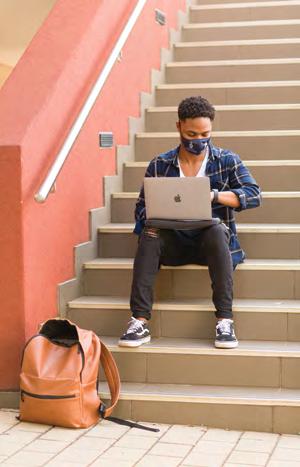
Recruitment
The annual #ChooseUP information event for conditionally admitted students and their parents and guardians was held virtually, for the first time, on 15 August 2020. Over 12 000 participants attended. The University’s undergraduate recruitment strategy emphasises the importance of responsible study and career choices and the employability of students, through a variety of events. This was noted by UNICEF, among others, and led to a sponsorship which enabled UP to develop a JuniorTukkie-UNICEF Online Platform. An equally important development was the partnership with StudyPortals, an international virtual platform, to expand UP’s attractiveness to international students.
Graduation
Virtual graduation ceremonies were also held for the first time. Degrees, diplomas and certificates were conferred in absentia to allow our graduates to receive their qualifications and start seeking employment.
The University awarded 12 881 diplomas and degrees in 2020, an increase of 24 graduates compared to 2019 (12 857). The total number of master’s graduates in 2020 was 1 801 compared to 2 008 in 2019, and that of doctoral graduates was 374 compared to 399 in 2019. In 2019 there were 557 distance education graduates, which decreased to 409 in 2020. There was an increase of 674 graduates in undergraduate contact programmes, from 6 617 in 2019 to 7 291 in 2020.
Ready-for-Work and TuksCareers
UP consistently ranks among the top four South African universities in the Quacquarelli Symonds (QS) Graduate Employability Survey, which shows that our graduates are well equipped for the workspace, and highly sought after.
Our Ready-for-Work programme provides students with key employability skills. The improved programme was launched in March 2020 after review in 2019. Enrolment increased from 3 438 in 2019 to 4 398 in
2020. The University upgraded and extended its online soft skills training courses, accessible to UP students via ClickUP. TuksCareers is an online platform that affords UP students and alumni the opportunity to interact with potential employers and access work-readiness skills. Workshops focusing on creating a résumé and cover letters, as well as preparation for interviews, were offered. Industry expert master classes are also offered to students to advance their employability. TuksCareers has 2 697 active companies on its database.
There are various opportunities at UP for training in entrepreneurship and in 2020 the Centre for Entrepreneurship, established in 2019, undertook activities such as:
• Basic small, medium and micro-enterprises training at the Mamelodi Business Clinic; • Practical business exposure for students and prospective students through the EMS Business
Incubator and EBIT’s TuksNovation; • Grant-funded programmes to support existing entrepreneurs through the GIBS Entrepreneurship
Development Academy; and • Online training for UP students: #Start_UP, #Link_UP and #Grow_UP.
Student health and wellness
Student well-being is integral to the University’s ethos, and this was highlighted during COVID-19 as a consequence of the negative impact the pandemic has
2020 Total Enrolment
MALE FEMALE
2019 6 617
2020 7 291
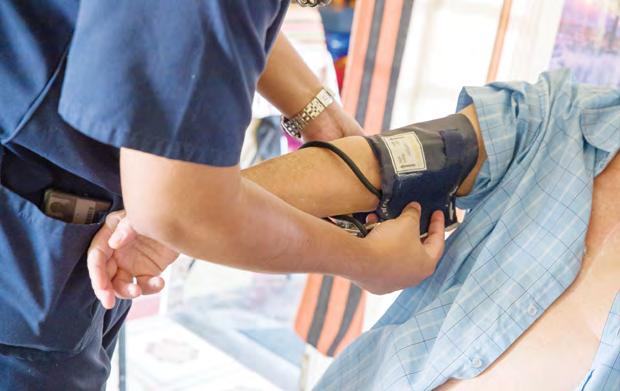
had not only on the physical but also the mental health of the UP community. Our Student Health Services Unit has a student clinic on each campus, staffed by a team of medical doctors, professional nurses, dietitians, optometrists and HIV-testing staff. Free services include diagnostic and treatment services, dietary and pregnancy consultations, contraception, eye tests, HIV/ Aids counselling and testing, immunisation drives, and specialist referrals. The clinics also run monthly health and wellness awareness campaigns. various social media platforms. A total of 14 160 students were reached through these virtual campaigns.
The University employed seven extra clinical psychologists on a part-time basis to assist with the increased demand for services. The Student Counselling Unit continued academic counselling and assessments, therapeutic services, psycho-educational and emotional support to students, to ensure that they were equipped to deal with trauma or personal and academic stress.
The unit’s professional psychological support was adjusted for complete virtual delivery. They also developed self-help materials for students to access online, including video clips giving exam tips, podcasts focusing on mental health and well-being, and a competition focusing on resilience.
Fewer students used the health services facilities in person in 2020 than in previous years. There were 6 464 consultations, mainly at the start and towards the end of the academic year, and these included a total of 335 free pap smears conducted in 2020. Immunisations against communicable diseases such as meningitis, rabies, hepatitis B and flu dropped from 6 142 in 2019 to 1 208 in 2020. Altogether 1 725 students were reached through face-to-face health awareness campaigns before the suspension of contact classes. The planned health awareness campaign programme for 2020 was then reformatted for virtual content via the UP Web and The partnership with the South African Depression and Anxiety Group (SADAG) was extended to include the private residences in Hatfield. SADAG sent emails to all first-year students, and the University also employed the sessional services of a local psychiatrist.
Higher Health
The University continued to use the R500 000 grant from Higher Health, awarded in 2019, to support institutionally based health, wellness and development programmes. A portion of the funding was used to provide vitamin supplements to students in need. Some funding was also reprioritised for the development of additional video material with gender-based violence and COVID-19 content.
Student housing
When the national lockdown started and students had to leave campuses, 236 of the 9 465 students in residence were unable to return home. These were mainly international and postgraduate students. Special arrangements were made for their health and wellness, and to ensure that they received food and other essentials.
The University also made special arrangements to courier computer equipment and academic materials to students at their homes, to allow them to continue their studies remotely.
Residences and associated services gradually reopened in line with national lockdown regulations, specifically for health sciences students on clinical rotations. Provision was also made for the return of indigent students whose circumstances were not conducive for them to study or write online examinations from home. By the end of the year, 5 351 indigent students had returned to residence, with all the necessary health and safety protocols and regulations in place.
Student hunger and nutrition
As part of our ongoing efforts to stem student hunger, UP continued its practice of providing a loan advance to each residence student to help them to afford dining hall meals until their National Student Financial Aid (NSFAS) or bursary funds paid out. The Student Nutrition and Progress Programme at UP continued to provide support to students in need. Instead of meal credits or food parcels, support was in the form of allowances for food and basic toiletries. Approximately R670 000 was drawn from the UP budget in 2020 for this purpose, supplemented by product donations from non-governmental organisations, churches and the private sector.
Student Governance
The demographically representative 19-member SRC played a very active role during 2020. The year also saw smooth student governance elections, with campaigning and voting conducted fully online for the first time.
INNOVATIVE TECHNOLOGY
The University’s information and communications technology played a pivotal role in the continuous provision of services to staff and students throughout the pandemic. We have strengthened our information technology (IT) infrastructure to support remote work, as well as remote teaching and learning. Laptops and connectivity were provided to students in need and appropriate staff were given data allowances to enable them to work from home.
An increasing number of students use their personal devices for academic work or to access the Internet and other UP systems through the Wi-Fi network. This has
led to a dedicated Student IT Hub being established to provide technical support. Student Computing, through the Student Hub, switched successfully to a remote service model and provided invaluable support during online tests and examinations.
The University also upgraded its IT servers and data storage, establishing a second data centre to address the risk associated with recovery of institutional data in the event of damage to the current single data centre. Software migration to the new platform is expected to be completed by the end of 2021.
We introduced a range of interventions and software, and upgraded the existing software, with the aim of enhancing student success. These interventions and products included:
• VitalSource, an e-book platform, available within
ClickUP • Open Educational Resources (OER): lecturers are encouraged to use OER and related materials. • Video assessment software and tools (H5P software) • Clicker Mobile App (TurningPoint Mobile Clicker Solution) • Blackboard/ClickUP Ultra: in December 2020, UP switched to Blackboard Ultra navigation to enhance mobile access and to prepare lecturers for the migration to ClickUP Ultra • Proctorio: there was a small pilot study to determine the effectiveness of this online proctoring system • Cirrus Assessment software, which will replace the
University’s current version of QM Perception, was branded as QuestUP • An online case management system tailored to the
South African higher education market, was adopted in 2020 by our Faculty Student Advisors • An electronic lecturer evaluation system (EvaluationKIT by Watermark).
The University organised a virtual Flexible Futures Conference in August 2020, with the theme Teaching Innovations in Higher Education: COVID-19 and Beyond, for which 368 people registered. The sponsors for this conference included Blackboard, Cengage, Amazon Web Services and the DHET’s University Capacity Development Programme.
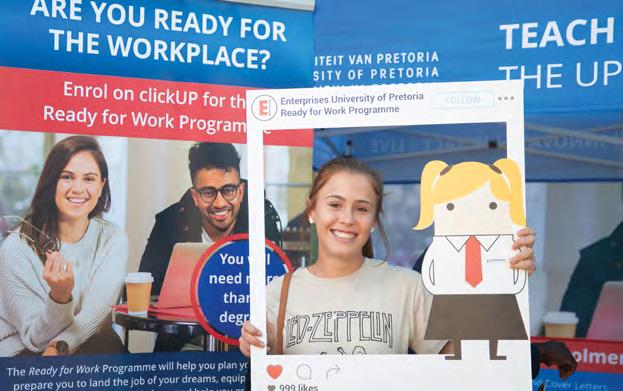
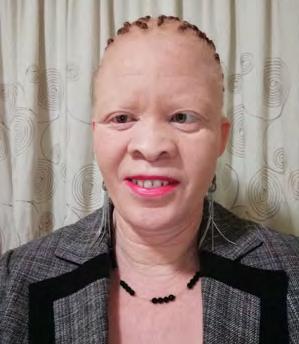
Nontsikelelo Loteni was appointed as the Director: Transformation.
STAFF AND STUDENT PROWESS
Notable Appointments
There were several notable appointments during 2020, a few of which are listed below:
• Prof Anton Ströh, Vice-Principal: Research,
Innovation and Postgraduate Education. Prof Ströh is also responsible for the operational leadership of
Institutional Planning, Monitoring and Evaluation, where he was previously Vice-Principal • Dr Morris Mthombeni, interim Dean of GIBS • Lindiwe Soyizwapi, Director: Department of Library
Services • Nontsikelelo Loteni, Director: Transformation • Dr Marinda Visser, Director: Strategic Projects and
Partnerships in Agriculture, Innovation Africa@UP • Prof Charles Maimela, at the age of 32, was appointed as the first black Deputy Dean of the Faculty of Law. • Prof Lindiwe Majele Sibanda, Director of the ARUA
Centre of Excellence in Food Security, which is hosted at UP in collaboration with the University of Nairobi and
University of Ghana, Legon. Profs Hettie Schönfeldt and Frans Swanepoel were appointed as co-directors. Vice-Chancellor and Principal, Prof Tawana Kupe, was elected to the Council of the Association of Commonwealth Universities and appointed as a trustee for three years. He was elected to serve on the International Council of the International Association for Media and Communication Research for a four-year term. He was appointed to the Kifra Prize Board and as co-chair of the Kifra Prize nomination panel. The Kifra Prize rewards breakthrough research in three categories, namely Science, Technology and Mathematics. In an unrelated accolade, Prof Kupe also became the first African member of Kairós, an international non-profit organisation that promotes the transformation of education to strengthen societies economically, socially and environmentally.
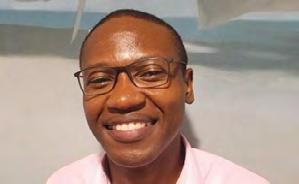
Prof Charles Maimela was appointed as the first black Deputy Dean of the Faculty of Law.
Prof Michael Daramola, Head of the Department of Chemical Engineering in the Faculty of Engineering, Built Environment and IT (EBIT), delivered the first-ever online inaugural address at UP on 27 October.
Student accolades
Despite limitations on movement and contact in 2020, our students demonstrated their resilience and academic excellence with a number of awards. For example:
• Final-year law student, Nicolas Herd, won the 2020
Yunus Mahomed Public Interest Award – Law/Business/
Ethics National Prize
• UP dominated the Absa Gradstar Top 100 with 19 students making it onto the list, the most from any institution • Entrants from the University represented three of the top five students in the Ernst & Young, Young Tax
Professional of the Year competition, open to students globally • UP-coached learners and students won the Moot Court
“World Cup” in Poland • Johannes Joubert and Joséphine Queffelect were finalists in the South African leg of Famelab, one of the biggest science communication competitions in the world • UP computer engineering students Ryan Naidoo

Ryan Naidoo

Jason Kamps
and Jason Kamps joined forces with Fiona Wong and
Michelle Sandhika of Hong Kong Polytechnic University to win an award for best proposal on social distancing at the Polytechnic University’s annual hackathon • Tuks FM represented South Africa in the World College
Radio Day in October, selected from a group of more than 550 radio stations • Shudufhadzo Musida, Bachelor of Social Sciences in
Philosophy, Politics and Economics graduate, was crowned as Miss South Africa, 2020
Sporting achievements
Despite a dearth of live sports events, our athletes dug deep in 2020 and our Sportswoman and Sportsman of the Year for 2019, Tatjana Schoenmaker and Akani Simbine, continued their winning streaks:
• Tatjana set two new Africa swimming records (100m and 200m breaststroke) as well as a South African record in the 50m breaststroke at the SA Short Course
Championships. She won the gold medal and set the world record in the 200-metre breaststroke and also won the silver medal in the 100-metre breaststroke at the 2020 Olympic Games.
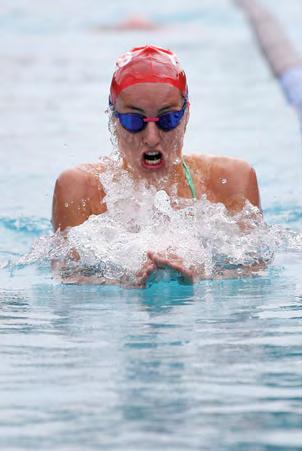
Tatjana Schoenmaker
• Akani (Adidas-Tuks) achieved another career first in Rome when he won the 100m during a Diamond
League Meeting, and did not lose once during the season. Akani also qualified for the 2020 Tokyo Games.
Athletics: Phatitshedzo Maswanganyi set a new South African junior record (under-20) for the 100m and became the first South African junior athlete to dip under 10.10s for the distance. Maswanganyi’s time of 10.06s is only 0.01s outside the Olympic qualification standard. Clarence Munyai qualified for the Olympic Games, running 20.23s in the 200m semi-final.
Badminton: Bongani van Bodenstein was part of the South African men’s team that won a bronze medal during the All Africa Championships in Cairo.
Chess: Tuks’s chess players were the overall Universities Sports South Africa champions for the third consecutive year. Both the men’s and women’s teams won their respective categories, setting new records and in the process, claiming 35 of the 36 gold medals.
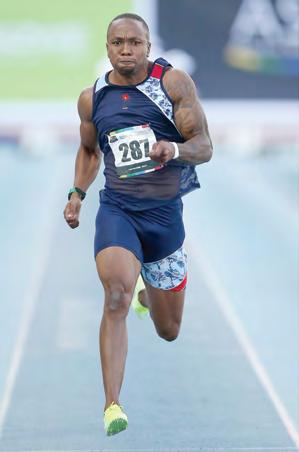
Akani Simbine
Cricket: At the beginning of 2020, Curtis Campher was playing cricket for Assupol Tuks; a few months later he was enjoying an international cricketing career. After being offered an emerging players contract, the 21-year-old debuted for Ireland against England in July in Southampton.
Sailing: Tuks and Wits sailors steered their boat Ciao Bella-JM Busha 54 to victory in the monohull-category of the Cape2Rio Yacht race, and placed third overall. Michaela Robinson (skipper) and Jonathan Ham (trimmer) represented UP in the student crew.
Wrestling: Arno van Zijl won gold for a second consecutive year at the African Championships.







